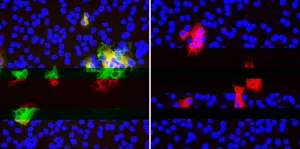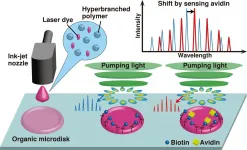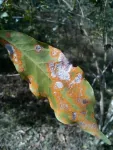Impact of spokesperson identity on sharing of public health messages
Survey takers more willing to share COVID-19 messages from a prominent expert versus a celebrity
2021-02-03
(Press-News.org) Participants in an international survey study reported greater willingness to reshare a call for social distancing if the message was endorsed by well-known immunology expert Anthony Fauci, rather than a government spokesperson or celebrity. Ahmad Abu-Akel of the University of Lausanne, Switzerland, and colleagues Andreas Spitz and Robert West of the École Polytechnique Fédérale de Lausanne, report these findings in the open-access journal PLOS ONE on February 3.
Previous research has extensively explored how to maximize the effectiveness of public health messages by altering their style and content. However, relatively few studies have examined the impact of spokesperson identity on the effectiveness of health messages, especially during crises like the ongoing COVID-19 pandemic.
To better understand this impact, Abu-Akel , Spitz, and West conducted a survey of 12,194 people from six countries in March of 2020. The survey was framed as an evaluation of people's perspectives on the pandemic. It included a question about participants' willingness to share a message that encouraged social distancing, ostensibly endorsed by one of four randomly selected spokespersons: Fauci, Tom Hanks (who had notably contracted COVID-19), Kim Kardashian, or a prominent government official from the survey taker's country.
The researchers found that, across all six countries (Brazil, Italy, South Korea, Spain, Switzerland, and the U.S.), participants reported greater willingness to share the social-distancing message if told it was endorsed by Fauci versus any of the other three spokespersons. This preference held true after accounting for participants' varying demographics and attitudes towards social distancing.
Endorsement by the celebrities was less likely to prompt willingness to share than endorsement by a government official, or no endorsement at all. Participants who were older or reported positive sentiments toward their randomly selected spokesperson were more likely to be willing to share the message.
These findings could help guide governments' selection of the best spokespeople to convey public health messages in order to maximize their effectiveness, for example to encourage vaccine acceptance. Future research could examine the impact of other spokespersons, such as religious leaders, and explore which traits make certain spokespersons more effective than others.
The authors add: "While we observed spokespersons who were liked by their audience to be more effective at increasing respondents' willingness to re-distribute a public health message, the relative effectiveness between expert,
government, and celebrity spokespersons did not change, with the expert
being the most effective. Thus, identifying and empowering liked and
trusted experts is a key component of effective public health
communication during the ongoing pandemic, and it is likely preferable
to using celebrity advocates."
INFORMATION:
Citation: Abu-Akel A, Spitz A, West R (2021) The effect of spokesperson attribution on public health message sharing during the COVID-19 pandemic. PLoS ONE 16(2): e0245100.
https://doi.org/10.1371/journal.pone.0245100
Funding: AA and RW received funding by a grant from the EPFL/UNIL Collaborative Research on Science and Society (CROSS) Program. RW received financial support from the Swiss Data Science Center. RW was in part supported by a gift from Google and Facebook. Reception of these gifts does not alter our adherence to PLOS ONE policies on sharing data and materials. The funders had no role in study design, data collection and analysis, decision to publish, or preparation of the manuscript.
Competing Interests: AA and RW received funding by a grant from the EPFL/UNIL Collaborative Research on Science and Society (CROSS) Program. RW received financial support from the Swiss Data Science Center and by grant 200021_185043 from the Swiss National Science Foundation. RW was in part supported by a gift from Google and Facebook. Reception of these gifts does not alter our adherence to PLOS ONE policies on sharing data and materials. The funders had no role in study design, data collection and analysis, decision to publish, or preparation of the manuscript.
In your coverage please use this URL to provide access to the freely available article in PLOS ONE:
https://journals.plos.org/plosone/article?id=10.1371/journal.pone.0245100
ELSE PRESS RELEASES FROM THIS DATE:
2021-02-03
DALLAS - Feb. 3, 2021 - Inactivating a gene in young songbirds that's closely linked with autism spectrum disorder (ASD) prevents the birds from forming memories necessary to accurately reproduce their fathers' songs, a new study led by UT Southwestern shows.
The findings, published online today in Science Advances, may help explain the deficits in speech and language that often accompany ASD and could eventually lead to new treatments specifically targeting this aspect of the disorder.
Study leader Todd Roberts, Ph.D., associate professor of neuroscience and a member of the Peter O'Donnell Jr. Brain Institute at UT Southwestern, explains that the vocalizations that comprise a central part of human communication are relatively unique among ...
2021-02-03
A novel artificial intelligence (AI) approach based on wireless signals could help to reveal our inner emotions, according to new research from Queen Mary University of London.
The study, published in the journal PLOS ONE, demonstrates the use of radio waves to measure heartrate and breathing signals and predict how someone is feeling even in the absence of any other visual cues, such as facial expressions.
Participants were initially asked to watch a video selected by researchers for its ability to evoke one of four basic emotion types; anger, sadness, joy and pleasure. ...
2021-02-03
(Boston)-- While a number of topical products designed to reduce the occurrence of sexually transmitted infections have been tested with largely disappointing results, researchers at Boston University School of Medicine (BUSM), Alpert Medical School of Brown University and Mapp Biopharmaceutical have now found that MB66, a vaginal film product containing monoclonal antibodies against human immunodeficiency virus-type 1 (HIV-1) and herpes simplex viruses types 1 and 2 (HSV-1 and 2), is safe and effective.
HIV-1 and HSV-1 and 2 are relatively common sexually transmitted infections associated with significant illness and sometimes even death. Though antiviral drugs can suppress viral concentrations and dramatically slow ...
2021-02-03
Humans continuously observe and evaluate interactions between third parties to decide with whom to interact in the future. But it is difficult to measure what information animals gain when they eavesdrop on vocal interactions between conspecifics: If they do understand such conversations, they do not necessarily exhibit behavioral expressions that can be easily observed. To overcome this hurdle, anthropologists from the University of Zurich created a study combining call simulations, thermography methods and behavioral preference measures.
Using thermal imaging, the researchers were able to non-invasively measure temperature changes in the faces of marmoset monkeys to quantify ...
2021-02-03
Narrowing of the trachea or the main bronchi due to injury or illness can end very badly. If patients get too little air,oxygen, they risk suffocating and often need medical help as quickly as possible.
Surgeons insert stents made of medically usable silicone or metal as a way of treating these patients. Although they quickly bring relief, the implants also have disadvantages: Metal stents have to be removed surgically with some effort, which is a burden for the patients, while silicone stents often migrate away from the insertion site. The reason for this is that the implants are not adapted to a patient's anatomy.
An ETH Zurich research team, composed of members of the Complex Materials and Drug Formulation and Delivery groups, has now developed an ...
2021-02-03
New technology developed by the University of Bristol has the potential to accelerate uptake and development of on-chip diagnostic techniques in parts of the world where rapid diagnoses are desperately needed to improve public health, mortality and morbidity.
Microfluidic devices underpin lab-on-a-chip (LOC) technologies which are developed to provide the rapid diagnoses at that are needed at point of care (POC) for the swift and effective treatment of many diseases.
Researchers at Bristol have developed a fast, reliable and cost-effective alternative for producing the soft-lithographic moulds used for fabricating microfluidic devices, published in the journal ...
2021-02-03
PITTSBURGH, Feb. 3, 2020 - In a recurring pattern of evolution, SARS-CoV-2 evades immune responses by selectively deleting small bits of its genetic sequence, according to new research from the University of Pittsburgh School of Medicine.
Since these deletions happen in a part of the sequence that encodes for the shape of the spike protein, the formerly neutralizing antibody can't grab hold of the virus, the researchers report today in Science. And because the molecular "proofreader" that usually catches errors during SARS-CoV-2 replication is "blind" to fixing deletions, they become cemented into the variant's genetic material.
"You can't ...
2021-02-03
Researchers have identified a pattern of deletions in the spike (S) glycoprotein of SARS-CoV-2 that can prevent antibody binding. Virus lineages featuring this mechanism are currently being transmitted between individuals globally, they say. Their results - reported after analyzing nearly 150,000 S gene sequences collected from many parts of the world - exhibit a form of virus "escape" that resulted from a common, strong selective pressure; for example, the authors identified at least nine instances where deletion variants arose in patients whose COVID-19 infections were persistent. So far, the strongest indicator of protection against SARS-CoV-2 appears to be humoral immunity, such as by antibodies, ...
2021-02-03
WASHINGTON -- Researchers have developed a unique inkjet printing method for fabricating tiny biocompatible polymer microdisk lasers for biosensing applications. The approach enables production of both the laser and sensor in a room temperature, open-air environment, potentially enabling new uses of biosensing technologies for health monitoring and disease diagnostics.
"The ability to use an inexpensive and portable commercial inkjet printer to fabricate a sensor in an ambient environment could make it possible to produce biosensors on-site as needed," said research team leader Hiroaki Yoshioka from Kyushu University in Japan. "This could help make biosensing widespread even in economically disadvantaged ...
2021-02-03
Coffee rust is a parasitic fungus and a big problem for coffee growers around the world. A study in the birthplace of coffee - Ethiopia - shows that another fungus seems to have the capacity to supress the rust outbreaks in this landscape.
"Coffee leaf rust is a fungal disease that is a problem for coffee growers around the world, especially on Arabica coffee, which accounts for three quarters of global coffee production and has the finest cup quality. There is a need to learn more about natural solutions instead of just applying pesticides," says Kristoffer Hylander, professor at the Department of Ecology, Environment and Plant Sciences (DEEP) at Stockholm ...
LAST 30 PRESS RELEASES:
[Press-News.org] Impact of spokesperson identity on sharing of public health messages
Survey takers more willing to share COVID-19 messages from a prominent expert versus a celebrity





